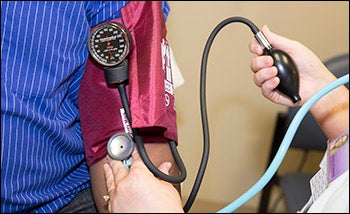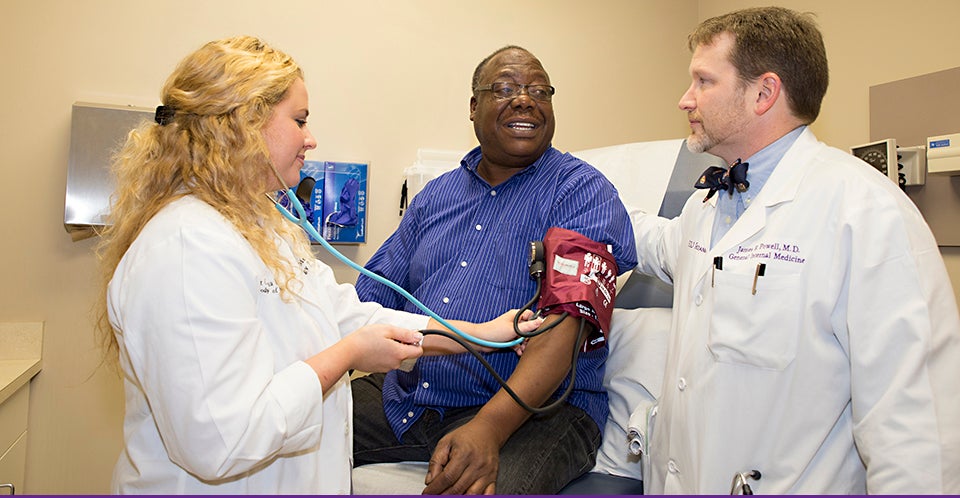SPRINT SUCCESS
ECU a critical partner in nationwide blood pressure study
East Carolina University has played a leading role in a clinical trial that may change the way health care providers treat high blood pressure.
Landmark research involving Brody School of Medicine faculty and patients has shown that more aggressive use of medications to lower systolic blood pressure below common recommendations significantly improves cardiovascular outcomes.
Nearly one in three American adults have high blood pressure, or hypertension, according to the Centers for Disease Control and Prevention. The condition is a leading risk factor for heart disease, stroke, kidney failure and other health problems. Blood pressure levels can be influenced by genetics, diet and lifestyle.
The National Institutes of Health sponsored the multifaceted Systolic Blood Pressure Intervention Trial (SPRINT) – the largest study of its kind to date. Launched in 2009, it includes more than 9,300 participants ages 50 and older with high blood pressure and an increased risk of heart or kidney disease. Approximately 250 of those participants – the second largest cohort within the national trial – are receiving care at ECU’s Brody School of Medicine.

At a press conference announcing the findings of the SPRINT research are SPRINT trial patients Anthony Thomas of Greenville and Eleanor Petteway of Kinston; Dr. James Powell, chief of general internal medicine for ECU and primary investigator for SPRINT’s ECU site; ECU internal medicine physician Suchita Pancholi; and Dr. Paul Bolin, chair of the ECU Department of Internal Medicine and sub-investigator for the trial. (Photo by Cliff Hollis)
“Due to the large representation of our patients in this trial, we feel very comfortable translating these findings into the patient population we serve here in eastern North Carolina,” said Dr. James Powell, ECU chief of general internal medicine and the primary investigator for ECU’s trial site, who enrolled the first patient of the entire trial.
According to the 2013 Behavioral Risk Factor Surveillance System – managed by the N.C. State Center for Health Statistics Across North Carolina – approximately 35.5 percent of adults reported being “told by a doctor that they had hypertension.” In the East, that rate was even higher at 38.9 percent. Even more alarming was the percentage of African American respondents in the region who reported being told they had hypertension: 46.6 percent.
Patients in the SPRINT study were randomly divided into two groups. One group received an average of two medications to keep their systolic blood pressure at 140, while the other group was given “intensive treatment” – averaging three medications – to lower their blood pressure to 120.
Systolic blood pressure is the “top number” in a blood pressure reading that measures the pressure in the arteries as the heart muscle contracts.
Initial findings demonstrate that “intensive treatment” reduces the rate of heart attacks, strokes and heart failure by a third – and the risk of death by almost 25 percent – in the patient population studied. Reaching that conclusion before the trial’s scheduled closure date prompted researchers to end this particular arm of the study earlier than expected.

Results of research conducted in part at East Carolina University could affect treatment of hypertension across the United States. (Photo by Gretchen Baugh)
“Optimum blood pressure targets have been debated by experts in recent years, but this is the first trial of any size that provides evidence of improved outcomes in all participants as a result of reducing systolic blood pressure to below 140,” said Dr. Paul Bolin, chair of the Department of Internal Medicine at Brody and sub-investigator for the trial.
Although the results still need to be confirmed, Bolin believes this study could potentially increase the number of hypertension diagnoses in America. “The financial consequences of that are enormous, so we need to get it right,” he said.
Bolin cautioned people to talk to their primary care providers to determine whether this lower goal is best for their individual care.
“Every time you add a medicine, you add the chance of a side effect. And every person is different. We have to remember that we’ve only been treating hypertension in this country for a relatively short period of time,” Bolin added. “This study may change the way we practice medicine in the future, but not the way we practice it today.”
Each patient in the study was prescribed medication based on medical history and protocol that would help the patient achieve their blood pressure goal.
“You look at potential side effects, you look at the patients and try to find the right [medication],” Powell said. “Every medicine that was used in this study is medicine that we have been using for a number of years.” “These are drugs that I have written several thousand times,” he added. “We were using meds that had been tried and true and that’s what adds a lot of weight to the findings.”
Over the next several months, Brody’s SPRINT trial participants will transition back to their primary care providers for their health care. Bolin stressed that ECU researchers will maintain close communication with these providers as the remaining arms of the study unfold.
“The communication [throughout the study] was wonderful. All along throughout the trial there was communication, and now as we’re rotating off the trial there is communication,” said Bolin, adding a thank you on behalf of the research team to all ECU, Vidant Health and private health care providers in Greenville and surrounding areas who recruited participants for the trial.
In addition to the pivotal transparency between researchers and providers, Bolin also credited the patients for the success of the study.
“The thing that I think sometimes gets lost in big clinical trials like this are the patients that are in it and the incredible contributions to mankind they make,” he said. “We would have none of these answers if we did not have patients willing to make that extra effort to be in these clinical trials.”
